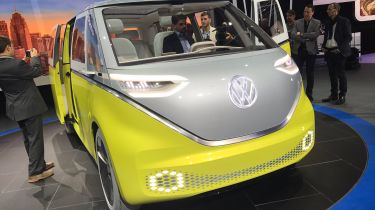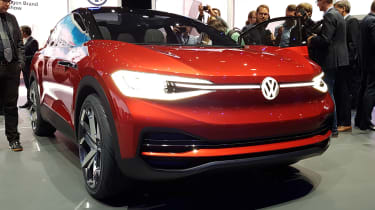Volkswagen's electric future
Volkswagen’s ambitions don’t end with today’s models. We reveal the tech that’s coming soon and lift the lid on the forthcoming ID. brand.
The future can be exciting and daunting in equal measure. The promise of inevitable progress is appealing; you can be sure there will be advances in areas such as science, technology, recycling and downsizing, all bringing great benefits for the planet and everything on it.
But what of the big challenges ahead, those we know about and those we don’t?
Volkswagen has committed itself to a number of key targets, all of which are aimed at delivering better technology, more advanced products and a better environment for everyone. Cars like the e-Golf are the first steps towards those goals, but in truth they are baby steps; what is to follow will represent the most seismic shift that the automotive world has ever seen.
The starting point is the Volkswagen ID., which is the first car the company has conceived from scratch to be all-electric. That means it will never be sold with a conventional combustion engine. This is a hugely significant step in itself, because it has allowed for a complete rethink on the car’s design, with no need to accommodate an engine and its related ancillaries. That means benefits in terms of space efficiency, but also in the technology it can offer – the ID. will bring high-level autonomous driving to the road within six years.
A new world
The ID. is a revolutionary vehicle, not just for Volkswagen but for the automotive world as a whole. It is just one part of a much bigger picture, though; because of its all-electric operation, the ID. will contribute zero tailpipe emissions for its entire life, which will make a significant contribution to air quality. However, Volkswagen is taking that to the next level, as Thomas Ulbrich, Member of the Board of Management of the Volkswagen Brand responsible for E-Mobility, explains. “At Volkswagen, we want to make a substantial contribution to climate protection,” says Ulbrich. “The ID. will take on a pioneering role in this regard; its production will balance out as CO2-neutral across the entire supply and production chain.“
The size of this challenge and the wholesale changes that need to be made along the way are vast. Three of Volkswagen’s manufacturing plants in Europe are undergoing radical redesigns in order to become ready for the production of electric vehicles, and by 2022 these plants will make only electric vehicles. The key plant at Zwickau in eastern Germany will be the first in the world to undergo the transformation from a conventional factory to one producing only electric vehicles.
Arguably even more significant is the level of change required to decarbonise the entire production process. Volkswagen has implemented a dedicated index to measure this, from the carbon-neutral production process at Zwickau to the use of green electricity for the manufacture of battery cells.
In the rare event that a supplier has unavoidable emissions during the process, it must offset them with investments into climate-protection projects with a view to eliminating them entirely as soon as possible. This vision follows right through to the owner, who can continue to be carbon-neutral by using green electricity, and the Volkswagen subsidiary Elli is growing a network of charging points and wall boxes to tie in with the launch of the ID. in 2020. Marco Philippi, Corporate Director, Strategy Group Procurement, says the vision for e-mobility starts from the very beginning of the process. “Sustainability standards are a binding selection criterion for our suppliers in the same way as quality or price,” he explains.
The way forward
The charging network, and the way it is used by the ID. and its sister models, is of course key to the success of the electric car concept as a viable means of transportation. But it’s also set to define any positive environmental aspects. “Charging will become fast, easy, convenient and – if the customer opts to use green electricity – clean,” says Martin Roemheld, Head of E-Mobility Services at the Volkswagen brand. “In 2020, the Volkswagen subsidiary Elli will also offer a broadly-based portfolio of wall boxes and charging solutions with sustainable electricity.”
The new Elli network will use the latest technology to bring the highest levels of functionality and efficiency. Smart electricity tariffs will take into account user demand and wholesale prices to give the most cost-conscious green prices, while energy management systems will use significant IT infrastructures behind the scenes to ensure a reliable network with maximum uptime. Digital billing will make charging a breeze for owners and smart charging cards will allow maximum freedom across the network.
Home wall boxes offering 11kW to give a full charge within five to eight hours are just the first step for an ID. owner; 22kW versions are set to follow, cutting the charging time to just three or four hours. The network of work-based chargers will grow, too, with the current 1,000 chargers set to expand to 5,000, while Volkswagen dealers will be a constant presence in providing fast and effective charging options for everyone.
ID. for all
The 2020 ID. will be the vanguard of Volkswagen’s electric direction, but it will not have to lead the charge on its own. A whole family of vehicles will be right behind it, bringing the same innovative design and game-changing efficiency, but in layouts to suit all needs. The legendary Volkswagen Microbus will be reborn in the shape of the ID. Buzz, combining the spirit and flexibility of the classic original with all the innovation of the ID. hatchback. The ID. CROZZ, meanwhile, will prove that electric cars can be dynamic and exciting as well as smart and efficient, crossing an SUV with a coupe aesthetic. And the ID. VIZZION is set to show the luxurious side of electrification, with impressive space, comfort and clever design for the ultimate electric express.
For more information on the Volkswagen e-Golf, visit volkswagen.co.uk

